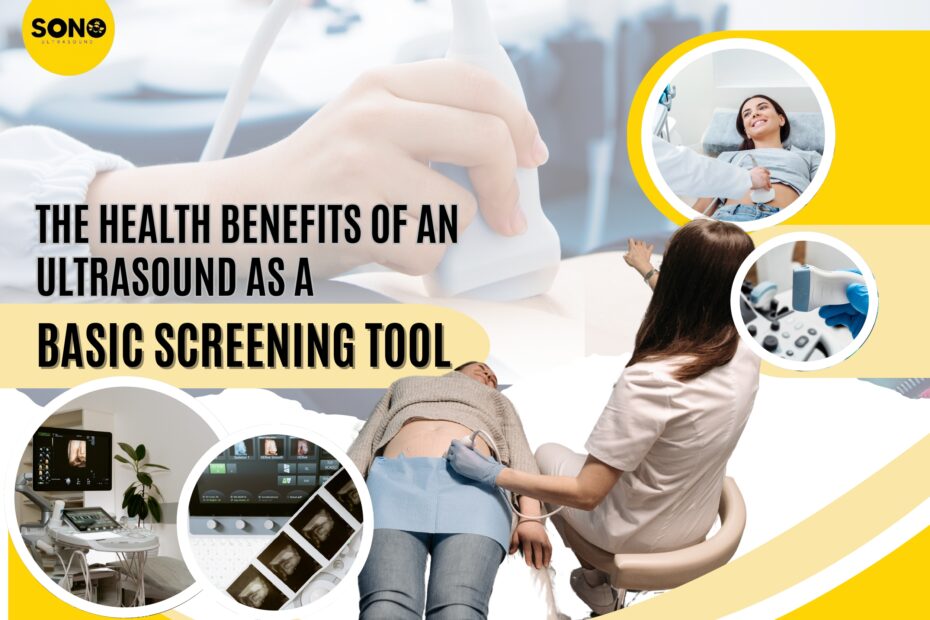An ultrasound is a safe, painless, and non-invasive test that uses sound waves to create images of the inside of the body. It is often used as a basic screening tool alongside other common tests like ECGs, X-rays, and blood tests. Ultrasounds are an important part of healthcare because they can help doctors quickly and accurately assess different organs and tissues, providing valuable information without the need for radiation or invasive procedures.
What is an Ultrasound?
An ultrasound uses a small device called a transducer, which is placed on the skin. The transducer sends sound waves into the body, and these waves bounce back to create images of internal structures on a screen. This makes it a great tool for examining various parts of the body, such as the heart, liver, kidneys, and more. The test is safe for all ages, including pregnant women, because it doesn’t use harmful radiation.
How Ultrasound Fits Into Basic Health Screening
Ultrasound is often used alongside other common screening tools, such as:
1️⃣ ECG (Electrocardiogram)
An ECG measures the electrical activity of the heart to detect heart rhythm problems or heart disease. While ECGs show how the heart is functioning electrically, ultrasounds can show the structure and movement of the heart, giving doctors a complete picture of heart health.
2️⃣ X-ray
X-rays use a small amount of radiation to take pictures of bones and certain tissues. They are excellent for diagnosing bone fractures or lung conditions. Ultrasounds, however, are better for viewing soft tissues like the liver, kidneys, and gallbladder, which X-rays can’t show clearly.
3️⃣ Blood Tests
Blood tests are commonly used to check for signs of disease, measure organ function, or assess overall health. While blood tests provide essential information about what’s happening in your body, ultrasounds offer a more direct way of seeing physical changes or abnormalities in organs and tissues.
Health Benefits of Using Ultrasound as a Basic Screening Tool
☑️ Early Detection of Health Problems
One of the biggest benefits of using ultrasound is its ability to detect potential health issues early. Whether it’s a cyst, a tumor, or an enlarged organ, ultrasounds can help doctors identify abnormalities before symptoms even appear. This allows for earlier intervention and treatment, improving overall outcomes.
☑️ Safe and Non-Invasive
Unlike X-rays, ultrasounds don’t use any radiation. This makes them a safe option for people who need regular imaging, such as pregnant women, children, or those with chronic health conditions. It’s also non-invasive, meaning there’s no need for needles, surgery, or any recovery time.
☑️ Real-Time Imaging
Ultrasounds provide real-time images, allowing doctors to see how organs are functioning as they work. For example, doctors can see the heart beating or blood flowing through blood vessels. This dynamic view helps in diagnosing issues like heart valve problems or blockages in the blood vessels.
☑️ Guiding Treatment Decisions
Ultrasounds are often used to guide further testing or treatments. For example, if an abnormality is found in the liver during a routine ultrasound, a biopsy may be recommended to check for cancer. The ultrasound helps doctors precisely locate the area that needs further testing, ensuring accuracy.
☑️ Complementary to Other Tests
Ultrasounds work well alongside other screening tools like ECGs, X-rays, and blood tests. Together, these tools provide a comprehensive view of your health. For example, while a blood test might show that liver enzymes are elevated, an ultrasound can show whether the liver is enlarged or has any masses.
Sonobee Health Ultrasounds Screening are a valuable part of basic health screening. When used alongside other common tests like ECGs, X-rays, and blood tests, ultrasounds help doctors get a complete view of your health. They are safe, non-invasive, and effective at detecting health issues early, guiding treatment decisions, and monitoring ongoing conditions. By combining these tools, doctors can provide a well-rounded approach to maintaining good health.
Book health screening here
Disclaimer: This content is for informational purposes only and should not replace professional medical advice. Please consult a doctor for any concerns
